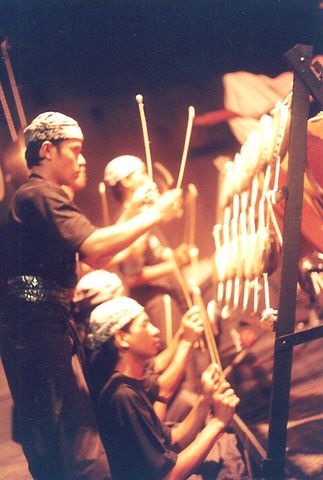Gamelan Concert
Mahatam Ensemble
Padangpanjang/West Sumatra

The group originates from the only culture in Indonesia characterised by a matriarchal model (Minangkabau). Although it is isolated from Javanese urban centres, an impressive music scene has developed in the area surrounding the Art Academy in Padangpanjang. This scene does not shy away from difficult combinations of Western and local instruments. Through their free and explorative spirit, this group of artists creates persuasive pieces in a chamber music style that goes beyond the scope of the usual pop music adaptations.
The Evening’s Compositions
Tolak Bala ( Hanefi Nafi , 2005)
Not only in Sumatra, but nearly all over the world, people perform ceremonies that serve religious purposes or which are tied to their lives in some important way. To this end, people make use of many different types of media, one of these being music. In the piece Tolak Bala, Hanefi concerns himself with religious songs, attempting to create a topical musical form on an abstract level. For this reason, vocal sounds and melodies are the focus of this piece.
Liar ( Admiral Tanjung , 2005)
In the Minangkabau language, the word “liar” means “unbound” or “unrestrained”. As the title of this piece, however, it does not refer to the way the work is played, but rather to the role of local art forms in the region inhabited by the Minangkabau ethnic group, a matriarchal society in the highlands of West Sumatra. In Liar, Admiral Tanjung makes use of two melodies, in addition to numerous other influences, from the repertoire of this region. This openness to diversity is an important characteristic of the work and is reflected in the title of the piece. According to Admiral Tanjung, “An important aspect of my composition is the juxtaposition of male and female voices, whether these be solo or in groups. This corresponds, symbolically, to the contrasts and conflicts in our society. In terms of vocal style, I attempted to write for human voices in such a way that they would be articulated like flutes (saluang).”
Ranji Hidup ( Elizar Koto , 2005)
An analysis of various songs from the Sijobang musical tradition in the Minangkabau region of West Sumatra provides the material for this piece. These songs are normally performed at night between 8:00 p.m. and 5:00 a.m. Most often they exhibit binary structure, but ternary and free rhythmical structures are also present—here adopted by Elizar Koto to build the over-arching framework of the piece. The quotations from the original sources are deconstructed, and finally “re-composed”, in the work, thus creating what can be regarded as a new form of contemporary folk music.
Sungsang ( I Dewa Nyoman Supenida , 2005)
“sungsang” means “inverse” or “opposite”. “As a Balinese, I come from a very strict and comprehensive musical tradition with many defined rules,” says the composer I Dewa Nyoman Supenida. “In my piece, I attempt—as a Balinese – to react in different ways to the contemporary state of things in West Sumatra. Thus, I employ, for example, the Balinese flute suling and the local (Minangkabau) flute suluang without straying from the techniques traditionally used to play them. In this way, I attempt to create a new, higher melodic quality along the lines of a dialogue. Moreover, I expand the catalogue of traditional norms by using phrases not only of regular, but also of irregular length, developing them each in a different manner. In a certain respect, I do everything in a way opposite to that prescribed by traditional rules. Nonetheless, this does not place me outside of tradition; rather through this approach I extend traditional possibilities of expression.”
Trad., Talempong Pacik: Gua Tujuah & Gua Indah
The traditional works here are called Talempong Pacik, which are played with small knobbed gongs and a variety of additional instruments. Lagu Solok comes from the repertoire of Islamic music and is performed here in its secular form with frame drums. Saluang Dendang pieces make primary use of the flute Saluang together with singing.
Programme
Hanefi Nafi: Tolak Bala (2005)
Admiral Tanjung: Liar (2005)
INTERVAL
Elizar Koto: Ranji Hidup (2005)
I Dewa Nyoman Supenida: Sungsang (2005)
Trad., Talempong Pacik: Gua Tujuah & Gua Indah
Director of the ensemble: Hanefi Nafi
Composers: Elizar Koto, Hanefi Nafi, Admiral Tanjung
Guest composer: I Dewa Nyoman Supenida, Bali
Within the framework of the Asia-Pacific Weeks, which are supported by the Stiftung Deutsche Klassenlotterie Berlin (DKLB).